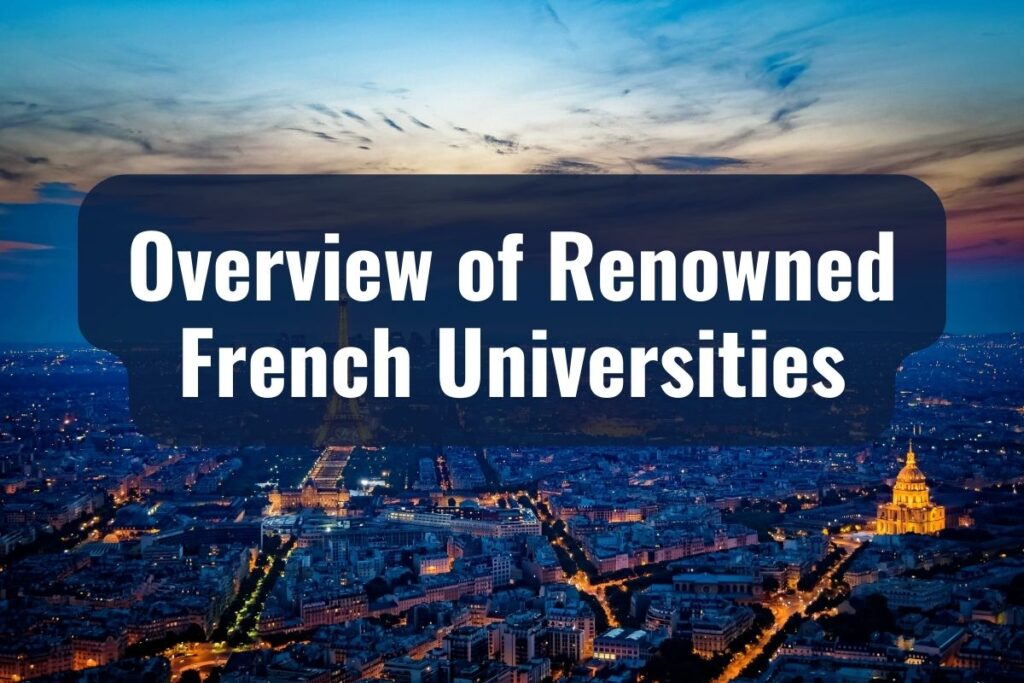For foreigners venturing into France for their academic pursuits, selecting the right university is a decision that holds substantial weight. The choice is not merely about academic programs and rankings; it’s about finding a place that supports and enriches the unique journey of an international student. This article aims to shed light on the best universities in France, offering insights into their academic prowess, the availability of English-taught programs, and the overall experience of international students on these campuses.
This exploration is not just about listing top institutions; it’s about understanding what makes these universities stand out and how they cater to the diverse needs of international students. Whether you seek cutting-edge research opportunities, a vibrant student life, or a gateway to European culture and history, France’s universities offer a rich tapestry of experiences.
KEY TAKEAWAYS
- France’s top universities offer a blend of historic prestige, academic excellence, and diverse programs.
- The French higher education system is tailored to support and integrate international students.
- Life in France as an international student encompasses cultural adaptation, networking, and exploration.
- Navigating admissions and securing scholarships in France requires thorough research and planning.
Criteria for Selecting a Top University
Selecting the right university in France involves a careful evaluation of several key factors. These criteria are essential for ensuring that the university not only excels academically but also provides a supportive and enriching environment for international students.
Academic Reputation and Rankings
One of the foremost considerations is the academic reputation of the university. This reputation is often reflected in global university rankings, which take into account factors like research output, faculty quality, and academic resources. While rankings should not be the sole criterion, they do provide a useful benchmark for understanding a university’s standing in the global academic community.
Availability of Programs Taught in English
For international students, particularly those who may not be fluent in French, the availability of programs taught in English is crucial. This factor can significantly impact the accessibility of the university’s offerings and the overall learning experience. Universities that offer a substantial number of courses or entire programs in English are often more appealing to foreign students.
Support Services for International Students
The presence of dedicated support services for international students is another critical criterion. These services can include assistance with visa and housing processes, language support programs, orientation sessions, and other integration activities. Universities that prioritize the welfare and integration of their international student body typically provide a more welcoming and supportive environment.
Campus Life and Cultural Integration
Finally, the quality of campus life and opportunities for cultural integration play a significant role in the university selection process. Prospective students should consider the vibrancy of campus life, including clubs, societies, and events that promote interaction and cultural exchange. Additionally, the university’s location and its connection to the local community can greatly enhance the cultural and social experience of studying in France.
Overview of Renowned French Universities

France is home to some of the world’s most prestigious and academically distinguished universities. Each of these institutions carries a legacy of excellence and offers unique opportunities for international students. In this section, we provide an overview of some of the renowned French universities, highlighting their key attributes and contributions to the global academic landscape.
| University Name | Specialization | Notable Features | International Student Support |
| University of Paris (Sorbonne) | Humanities, Social Sciences | Historic Prestige, Diverse Programs | Language Support, Cultural Integration Activities |
| École Normale Supérieure (ENS) | Humanities, Sciences | Research Focus, Eminent Alumni | International Research Opportunities, Small Class Sizes |
| Sciences Po | Social Sciences | Interdisciplinary Approach, Global Partnerships | Extensive Exchange Programs, Vibrant Campus Life |
| Polytechnique | Science, Technology | Rigorous Curriculum, Industry Connections | Comprehensive International Student Services |
| Grenoble Alpes University | Physics, Engineering | Research in Sciences, Scenic Location | Housing Assistance, Language Courses |
| University of Strasbourg | Biology, Chemistry | Rich History, Diverse Programs | Orientation Programs, Student Clubs |
| Aix-Marseille University | Varied Disciplines | Large University, Vibrant Student Life | Health Services, Cultural Activities |
The University of Paris (Sorbonne)
The University of Paris, often referred to as Sorbonne after its historic main building, is one of the oldest and most esteemed universities in the world. With its roots dating back to the 12th century, the Sorbonne has become a symbol of French intellectual and cultural life. It offers a broad range of programs across the humanities, social sciences, and natural sciences. The university is particularly noted for its strong emphasis on research and its contributions to various academic fields.
École Normale Supérieure (ENS)
École Normale Supérieure, located in the heart of Paris, is a premier French grande école, known for its rigorous selection process and its tradition of producing eminent intellectuals, including multiple Nobel laureates. ENS excels in a variety of disciplines, with a particular strength in the humanities and sciences. It is a hub for cutting-edge research and fosters a close-knit academic community.
Sciences Po
Sciences Po stands out as a leading institution in the social sciences, particularly in political science and international relations. With its strong focus on interdisciplinary studies, it offers a diverse range of programs that blend theory and practice. Sciences Po is also known for its extensive network of international partnerships, providing students with numerous opportunities for global exposure.
Polytechnique
École Polytechnique, often simply referred to as Polytechnique or l’X, is one of France’s most prestigious and selective engineering schools. Known for its strong emphasis on science and technology, Polytechnique offers an intensive curriculum that combines rigorous academic training with practical application. The school is renowned for its research output and its close ties with the industry.
Other Notable Institutions
Grenoble Alpes University: Known for its research in physics, engineering, and computer science, and its beautiful location in the heart of the French Alps.
University of Strasbourg: Famous for its rich history, diverse academic programs, and a strong focus on research, especially in the fields of biology and chemistry.
Aix-Marseille University: One of the largest universities in the French-speaking world, offering a wide array of programs and known for its vibrant student life.
In-Depth Analysis of The Best Universities in France
Delving deeper into the characteristics of some of France’s top universities, we explore their unique features, academic strengths, and the specific aspects that make them appealing to international students.
University of Paris (Sorbonne)
Historic Prestige and Academic Excellence
The University of Paris, commonly known as Sorbonne, is not just a university but a symbol of academic heritage. With a history spanning over 800 years, the Sorbonne has been at the forefront of French education and intellectual development. It is especially renowned for its strengths in philosophy, literature, and history.
Diverse Programs and Faculty
The university offers a wide array of programs in the humanities and sciences, attracting a diverse faculty renowned for their research and teaching. The Sorbonne’s commitment to multidisciplinary studies allows students to gain a comprehensive and nuanced education.
Support for International Students
The Sorbonne is well-equipped to support its international students, offering various language programs, orientation sessions, and cultural integration activities. This support system is pivotal in helping foreign students adapt to life in Paris and succeed academically.
École Normale Supérieure (ENS)
A Center for Research and Academic Excellence
ENS stands out for its rigorous academic environment and its emphasis on research. Known for producing eminent scholars and intellectuals, including several Nobel laureates, ENS offers a stimulating environment for ambitious students.
Emphasis on Humanities and Sciences
While ENS is particularly noted for its humanities and sciences programs, it offers a wide range of disciplines. Its small class sizes and close faculty-student interaction foster a dynamic and collaborative academic atmosphere.
Opportunities for Foreign Students
ENS’s international focus provides numerous opportunities for foreign students, including partnerships with universities worldwide and participation in international research projects.
Sciences Po
Specialization in Social Sciences
Sciences Po is a leading institution in social sciences, offering innovative programs in political science, international relations, and sociology. Its curriculum is designed to blend theoretical knowledge with practical application, preparing students for global careers.
Global Partnerships and Exchange Programs
The university’s extensive network of international partnerships provides students with opportunities to study abroad and engage in collaborative projects. Sciences Po’s global orientation enriches the academic experience and enhances cultural understanding.
Extracurricular Opportunities and Campus Culture
Sciences Po’s vibrant campus life includes a plethora of clubs, societies, and events that foster student engagement and cultural exchange. This vibrant community life is integral to the overall student experience.
Polytechnique
Focus on Science and Technology
As one of France’s premier engineering schools, Polytechnique excels in science and technology. Its curriculum is rigorous, combining theoretical instruction with practical application and research.
Industry Connections and Career Prospects
Polytechnique’s strong ties with the industry and its focus on innovation open up vast opportunities for career advancement for its graduates. The school’s reputation in the scientific community is a significant asset for students.
International Student Integration
With a growing international student body, Polytechnique offers a range of services to help foreign students adapt, including language courses, cultural activities, and academic support.
These universities, each with their distinct characteristics and strengths, represent the pinnacle of French higher education. They offer a blend of academic rigor, rich history, and a supportive environment that is conducive to the growth and success of international students.
Life as an International Student in France

Embarking on an educational journey in France as an international student is an experience filled with unique opportunities and challenges. This section explores the various aspects of daily life that foreign students encounter, offering a glimpse into what it’s like to live and study in this culturally rich and diverse nation.
Accommodation and Living Expenses
One of the first considerations for international students is finding suitable accommodation. France offers a range of housing options, from university dormitories to private apartments. The cost of living varies significantly between cities, with Paris being notably more expensive than smaller towns. Students need to budget for rent, utilities, food, transportation, and other personal expenses. Many universities provide assistance with housing and offer advice on managing living costs effectively.
Cultural Adaptation and Language Barriers
Adapting to a new culture can be both exciting and challenging. France’s rich cultural heritage, its cuisine, traditions, and lifestyle are aspects that international students can immensely enjoy. However, the language barrier can be a significant hurdle. While many universities offer courses in English, daily life often requires some knowledge of French. Language courses, immersion programs, and social interactions can greatly aid in overcoming this barrier and enriching the overall experience in France.
Networking and Community Involvement
Networking and community involvement are crucial for international students. Universities in France often host a variety of clubs, societies, and events that encourage students to interact, share experiences, and build networks. Engaging in these activities can lead to lifelong friendships and professional connections. Additionally, it’s an opportunity to immerse oneself in the local culture and community, further enhancing the study abroad experience.
Understanding the French educational system is another aspect that international students need to navigate. The system may differ significantly from what students are accustomed to in their home countries. This includes different academic calendars, teaching styles, and assessment methods. Most universities offer orientation programs and academic advising to help students adjust to these differences.
Health and Well-being
Ensuring health and well-being while studying abroad is paramount. France has a comprehensive healthcare system, and students are usually required to have health insurance. Universities often provide health services and counseling to support students’ physical and mental well-being.
Travel and Exploration
Studying in France opens up numerous opportunities for travel and exploration. The country’s rich history, diverse landscapes, and cultural landmarks offer endless possibilities for discovery. Additionally, France’s location in Europe makes it a gateway to other European countries, offering students a chance to experience a variety of cultures and environments.
Related: Best Apps for Learning French: Master French Easily
For international students aspiring to study in France, navigating the admissions process and understanding the landscape of scholarship opportunities are crucial steps. This section aims to provide a clear and informative guide on how to approach these aspects effectively.
Understanding the Admissions Process
Research and Preparation
The first step in the admissions process is thorough research. Prospective students should familiarize themselves with the application requirements and deadlines of their chosen universities. This research should also include understanding the specific requirements for programs taught in English, if applicable.
Application Requirements
Generally, the application process for French universities involves submitting academic transcripts, letters of recommendation, a statement of purpose, and proof of language proficiency (either in French or English, depending on the program). Some programs may require additional components, such as portfolios or entrance examinations.
The Role of Campus France
Campus France, the national agency for the promotion of French higher education, is a valuable resource for international students. It offers guidance on the application process, visa requirements, and other essential information for studying in France.
Scholarship Opportunities and Financial Aid
Government Scholarships
The French government offers various scholarship programs for international students. These scholarships are often based on academic merit or specific partnerships between countries. Information on these scholarships can be found through Campus France or the French embassy in the student’s home country.
University-Specific Scholarships
Many French universities offer scholarships for international students. These scholarships can be merit-based, need-based, or specific to certain fields of study. Students should explore the scholarship options available at their chosen universities and understand the application process for each.
Other Sources of Funding
Additional sources of funding include international organizations, foundations, and private institutions that offer scholarships for study abroad programs. Researching these opportunities requires diligence and attention to application deadlines and criteria.
Financial Planning
It is essential for students to plan their finances carefully. While scholarships can significantly reduce the financial burden, students should also consider other expenses such as accommodation, food, transportation, and health insurance in their budget planning.


